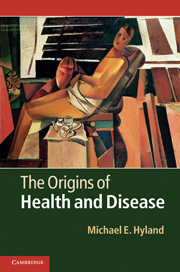Book contents
- Frontmatter
- Contents
- List of figures
- List of tables
- List of boxes
- Acknowledgements
- 1 The two philosophies: health, disease, medicine and psychotherapy
- 2 The body's mind: psychoneuroimmunology, stress and adaptive response
- 3 Personality, disease and the meaning of infornet dysregulation
- 4 Networks and their properties
- 5 The causes of dysregulation: associative learning, food intolerance and the effects of stress throughout the lifespan
- 6 The causes of dysregulation: supervised learning, repetitive strain injury, attention-deficit/hyperactivity disorder, chronic fatigue syndrome and depression
- 7 The causes of dysregulation: asthma and precursors to specific disease
- 8 Three different types of psychologically mediated therapy: placebos and the art of medicine, psychotherapy and complementary and alternative medicine
- 9 Therapeutic mechanisms
- 10 Finding the pattern: health in modern society
- 11 Infornet theory in perspective
- References
- Index
1 - The two philosophies: health, disease, medicine and psychotherapy
Published online by Cambridge University Press: 05 June 2012
- Frontmatter
- Contents
- List of figures
- List of tables
- List of boxes
- Acknowledgements
- 1 The two philosophies: health, disease, medicine and psychotherapy
- 2 The body's mind: psychoneuroimmunology, stress and adaptive response
- 3 Personality, disease and the meaning of infornet dysregulation
- 4 Networks and their properties
- 5 The causes of dysregulation: associative learning, food intolerance and the effects of stress throughout the lifespan
- 6 The causes of dysregulation: supervised learning, repetitive strain injury, attention-deficit/hyperactivity disorder, chronic fatigue syndrome and depression
- 7 The causes of dysregulation: asthma and precursors to specific disease
- 8 Three different types of psychologically mediated therapy: placebos and the art of medicine, psychotherapy and complementary and alternative medicine
- 9 Therapeutic mechanisms
- 10 Finding the pattern: health in modern society
- 11 Infornet theory in perspective
- References
- Index
Summary
What is this book about?
During the last 50 years modern science has provided explanations for many previously unexplained phenomena. Of those that remain unexplained, four are particularly pertinent to this book. First, up to a third of patients who attend their general practitioner (GP) have ‘medically unexplained symptoms’. The term ‘medically unexplained symptoms’ is self-explanatory. Such patients report symptoms in the absence of any diagnosed disease, which, more importantly, cannot be explained in terms of an underlying physiological abnormality – called pathophysiology. In addition, there are so-called functional diseases that cannot be explained in terms of pathophysiology, including chronic fatigue syndrome, irritable bowel syndrome and repetitive strain injury.
Second, for diseases that are understood in terms of their pathophysiology, it remains unclear how those diseases originate in the first place. We know that diseases such as cancer, heart disease and asthma arise out of a combination of genetics and lifestyle factors. In many cases the environment ‘switches on’ disease-causing genes that are otherwise inactive. In addition, research shows that events that occur in the womb and in early childhood can influence disease onset decades later. We do not know what exactly it is that is being ‘programmed’ by these early events to cause later disease. We do not know why or how environmental factors switch on disease-causing genes so that they express the biochemical changes that lead to disease.
- Type
- Chapter
- Information
- The Origins of Health and Disease , pp. 1 - 29Publisher: Cambridge University PressPrint publication year: 2011



